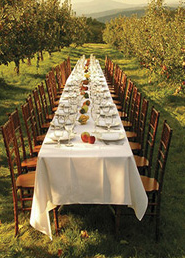 Grace
Grace Entries in Grace (51)
Who is Welcome?
 Wednesday, May 29, 2013 at 12:46PM
Wednesday, May 29, 2013 at 12:46PM  Surely Jesus believed that prostitutes were sinners, yet he welcomed them to his table. He ate and drank with them.
Surely Jesus believed that prostitutes were sinners, yet he welcomed them to his table. He ate and drank with them.
Surely Jesus understood that tax collectors betrayed their countrymen by helping the brutal Roman occupiers in his homeland, yet he welcomed tax collectors to his table as well.
Surely Jesus knew that religious hypocrites misrepresented Yahweh’s heart toward his people and laid heavy burdens on God’s people, yet he dined with them and invited them to participate in his Father’s kingdom.
Surely Jesus saw first-hand Peter’s temper, James and John’s foolish nationalism, even Judas’ tortured and divided motivations, yet he broke bread with each one of them, sharing his very body and blood.
Jesus welcomed everyone to his table. He welcomed the clueless and the cruel. He engaged the outcast and the insider. He shared his life with his enemies because he came to turn enemies into family. His method was startling: he ate and drank with them. Wherever Jesus ate, it was his table. He turned water into wine and transformed ritual into everlasting love. He turned no one away from his table.
He gave no one a pass on their rebellion or self destructive ways. The sinless perfect representative of God’s heart never lowered his standards or winked at injustice. Still, around his table everyone was welcome. He was no lightweight: if a moment called for brutal honestly, he fulfilled that need as well. He did not negotiate, he fellowshipped.
He set an example for us to follow. On his way to the cross he stopped to eat and drink each day, and each day he welcomed his enemies to his table. At the cross, he did what only he could do. At the table, he demonstrated what we can do.
He refused to let disagreement separate him from others. Jesus possessed the proper opinions, the right positions, and perfect perspective, but never--not once--did he use his correct standing as a reason to alienate other people.
Who is welcome at your table?
Meditation: I'm a Tiny Judge
 Monday, April 22, 2013 at 09:55AM
Monday, April 22, 2013 at 09:55AM  I used to think this was so clever: as a Protestant pastor I would refer to Roman Catholics as our “cousins.” I thought it highlighted our close association with Catholics while subtly reminding the listener of the differences between the great Reformation divide. Those Catholics are family, but only cousins. Pretty witty, eh? Not really. I’m ashamed to say that I did so for years.
I used to think this was so clever: as a Protestant pastor I would refer to Roman Catholics as our “cousins.” I thought it highlighted our close association with Catholics while subtly reminding the listener of the differences between the great Reformation divide. Those Catholics are family, but only cousins. Pretty witty, eh? Not really. I’m ashamed to say that I did so for years.
Eventually the still small voice of the Spirit began to get through. “Really, Ray? Do you really mean to say these people do not have the same Father?” I tried to argue with the voice for a while. “These people have such different practices.” I answered. “Their church is full of cultural influences that have nothing to do with the Scripture.” Case made, right?
The Spirit’s voice is gentle but strong: a velvet granite breath. “And your church? Don’t your practices seem strange to Baptists or Presbyterians? And what about the cultural influences in your church? Perhaps the Apostle Paul would have a thing or two to say about them?” Eventually I acknowledged these billion-plus people as part of God’s family. They are brothers and sisters, who call Jesus Lord and King. My opinions of their practices did not matter. God’s opinion does.
Then a marvelous thing happened. I discovered the Banqueting Table was longer than I had imagined. It stretched beyond my fleshly vision. I discovered I had been invited to come and feast, not criticize. I beheld sisters and brothers I had never known before. If I revered the Father why not revere the family?
And one more thing happened. A spirit of criticism began to lift from my mind. The real issue had never been about Protestants and Catholics. The issue was my critical, demanding heart. The issue was my self-appointed position as judge and jury over all God’s Kingdom (such a big Kingdom, and such a tiny judge!) I no longer felt the need to walk the police beat of orthodoxy. If a few impostors came to the feast, I knew the Father could choose who should eat and who would be shown the door. I was free to find the best in people and ignore their flaws. The same Spirit who corrected me could correct them.
So I suggest this week’s meditation: Is it possible we criticize other Christians publicly because inwardly we don't see them as family?
Meditation: Defining Grace
 Monday, March 4, 2013 at 11:47AM
Monday, March 4, 2013 at 11:47AM  Beware the questions of a child. Yesterday our fourth-grader asked, ”So, what is grace, exactly?” It only took a moment for me to discover “Grace” doesn’t yield to an exact definition.
Beware the questions of a child. Yesterday our fourth-grader asked, ”So, what is grace, exactly?” It only took a moment for me to discover “Grace” doesn’t yield to an exact definition.
When I tried to simplify it to “God’s goodness toward us,” she asked, “Then why don’t we just say ‘goodness?’”
When I tried the legal angle her eyes clouded over. I realized I could kill the word if I kept going, so I gave up the legal track.
“Why do people say that ballerinas are ‘graceful’?” she asked. (Great: I have a ten year-old philologist on my hands.) We talked for a half-hour, which is like graduate-level work for someone her age. We could’ve looked up more than 15 dictionary entries for the simple five-letter word, or another five-to-ten idioms ranging from “fall from grace” to “coup de grace,” and we draw no closer to our goal. Dallas Willard’s not much help. John MacArthur far too limiting. A photo of Grace Kelly is closer to the truth.
This is the wonder of Grace: as big as the sky, as close as your next breath. Grace is insubstantial and ethereal—nothing more than an idea—an idea that continues to change the world. Grace is love made practical. Grace empowers. Grace cares not for the argument, but for the people arguing. Grace has an agenda beyond the truth. Grace knows that the frustrated heart would rather sit on the sidelines and be wrong than be forced to run with the schoolyard bullies who are right. Grace turns its nose up at winning the fight and aims instead to win the person. Grace plays the long game.
The only unsatisfying part of God’s Grace is: it’s too big to comprehend. Would we want it any other way?
Please: consider this an invitation to (virtually) sit down with my daughter and give it your best shot. I’ll read her your answers, and spare you her questions.
Meditation: Glory, Goodness, and Grace
 Monday, February 25, 2013 at 11:17AM
Monday, February 25, 2013 at 11:17AM Some days are diamonds, some days are stones, and some days are calf manure. In the middle of betrayal and spiritual adultery on the part of the children of Israel, God chose to demonstrate his goodness to Moses. Exodus 33:12-23 details the time when Moses wanted to give up on leading God’s people, and give up on life. It takes only a moment to read, but this passage can change your life:
1). As Moses pleads with God for help, God answers simply, “My Presence will go with you, and I will give you rest.” God’s first answer is to offer his presence. It’s what we need most.
2). Moses responds with wisdom that still applies for us today: “What else will distinguish me and your people from all the other people on the face of the earth?” The distinguishing mark of God’s people is his presence. In times of victory or trouble, his presence is our identity.
3). God’s assurances are filled with his personal approval of Moses, and Moses is bold enough to push all the chips into the middle of the table, “Show me your glory.” What a strange request when there are so many problems to solve!
4). Finally, even as God himself says, “yes,” to Moses, God offers a gentle instruction. Moses asked, “show me your glory,” and God says, “I will cause my goodness to pass in front of you.” The lesson is: one of the ways God demonstrates his glory is to show us his goodness. Why not ask him today to open your eyes to his goodness?
(Bonus material: Exodus 34 reveals what Moses saw when God’s goodness passed by. Check it out.)
Meditation: Looking up from the Checklist
 Monday, January 21, 2013 at 01:37PM
Monday, January 21, 2013 at 01:37PM  Once there was a man who lived a life guided by a checklist. He did not always fulfill each item each day, but each and every day the checklist was his guide. All day long, eyes down, he navigated his life according to the inspired advice on the list. The man gained great wealth, and even some reputation among the people of his town, but at the end of his life he was no wiser than at the beginning, because the checklist was not enough. The checklist was his only friend, and he died alone.
Once there was a man who lived a life guided by a checklist. He did not always fulfill each item each day, but each and every day the checklist was his guide. All day long, eyes down, he navigated his life according to the inspired advice on the list. The man gained great wealth, and even some reputation among the people of his town, but at the end of his life he was no wiser than at the beginning, because the checklist was not enough. The checklist was his only friend, and he died alone.
Is there anything more handy than a checklist?
The original checklist was ten items long. Eventually it grew to 613. No checklist provides the desires of our hearts, but we cling to our checklists because we like to think they hold the secrets of life itself. We refine the lists, prioritize the lists, interpret our lists, and look down on other people’s lists. We claim to have special insight into the most important items on the list.
Whether God’s Old People or New, it’s so much easier for us to keep our eyes on the clipboard. Give to the poor? Check. Relax one day a week? Check. Sacrifice? Pray? Memorize? Check. Check. Check. The checkmarks fall into a neat line from top to bottom. We start a new page each day. We smile at the winning streaks we piece together, unaware we have won the wrong game.
We like checklists because is it easier to relate to a book of rules than to relate to a living person. Checklists are unchanging and accessible. People are filled with mystery. Checklists are clear and unequivocal. Checklists make plain statements and tell us what to do. People—even perfect people—present nonverbal hints and clues. People are hard to read, but they yield rewards we have never imagined. If we successfully keep a checklist, we have ourselves to thank. If we get to know a person, we discover a world beyond ourselves.
A question, what if we live our lives according the the master checklist, but never meet the Master himself?


